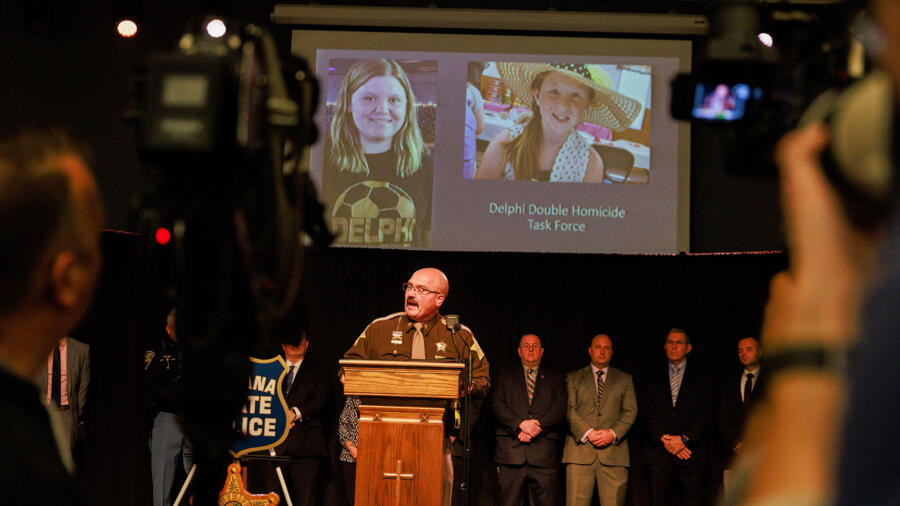In 2017, the lives of two teenage girls and an entire community changed forever. The small town of Delphi, Indiana—home to just under 3,000 people—was thrust into the national spotlight when best friends Liberty “Libby” German and Abigail “Abby” Williams vanished during a hike on a local trail. What followed was a chilling saga filled with mystery, grief, and a relentless search for justice.
The Delphi murders case didn’t just devastate two families—it fractured the emotional fabric of an entire town. Over the years, what helped bring answers, and what stood in the way of justice?
Let’s explore the six key facts that defined one of the most haunting cases in recent American criminal history.
The Day Delphi Lost Its Innocence
On February 13, 2017, Libby and Abby set out to enjoy a warm winter afternoon by hiking the Monon High Bridge Trail. The area, familiar and peaceful, had always felt safe. But the following day, searchers discovered their bodies near the trail—a discovery that would upend everything.
For the townspeople, the safety they once took for granted vanished. Parents clutched their children tighter. Conversations changed. In the heart of Indiana, fear took root.
Libby’s Heroic Act Preserved Critical Evidence
Before the horror unfolded, Libby did something extraordinary. She pulled out her phone and recorded a man following them on the bridge. His voice—grainy but unmistakable—uttered the command: “Guys, down the hill.” That brief clip became a chilling centerpiece of the Delphi murders case.
Although the footage lacked visual clarity, the audio helped shape the investigation. It gave law enforcement and the public a voice to pursue, a phrase that haunted everyone who heard it.
Confusing Sketches and Lingering Doubts
At first, investigators released a composite sketch of a suspect. Two years later, they discarded it and re-released a revised version—shockingly, the first sketch they had drawn. This unexpected reversal created confusion, and for many, it eroded trust in the investigation.
While authorities claimed this new sketch better reflected the suspect’s age, the contradiction led to skepticism. People wondered: Had precious time been wasted chasing the wrong lead?
A Shocking Arrest After Five Long Years
In October 2022, a breakthrough changed everything. Police arrested Richard Allen, a local resident who had once worked at a CVS and interacted with Libby’s family after the murders. Investigators alleged that an unspent bullet found at the scene matched Allen’s gun.
This revelation stunned the town. Even more unsettling, Allen had voluntarily spoken to police back in 2017—just days after the murders. He admitted being on the trail. Yet, somehow, he remained free for years. How did the system miss him?
Dark Theories and a Chilling Trial
As the case progressed toward trial, bizarre defense claims emerged. Allen’s attorneys suggested that the girls were victims of a ritual sacrifice by a cult with white nationalist ties. The claim shocked legal observers and deepened the mystery.
Meanwhile, Allen’s psychological state deteriorated in prison. According to his defense, his so-called confession to his wife and mother came under intense stress. Still, prosecutors stood by the evidence linking him directly to the scene.
Eventually, the trial concluded on November 11, 2024, with Allen convicted of both murders. The judge sentenced him to 130 years in prison on December 20. For the families, it brought justice—but not peace.
Healing Through Courage and Closure
Becky Patty, Libby’s grandmother, had long avoided the bridge where the girls were last seen. After Allen’s conviction, however, she looked at a reporter and said, “I think I’m ready to walk on the bridge.”
That simple statement marked a powerful shift—from mourning to healing. For Delphi, it meant reclaiming a space that had symbolized sorrow and turning it into one of remembrance and strength.
The community continues to grieve, but now they grieve with answers. And while nothing can replace Libby and Abby, the conviction offered something rare in cases like this—closure.
FAQs About the Delphi Murders Case
Who were the victims in the Delphi murders?
Liberty “Libby” German, 14, and Abigail “Abby” Williams, 13, were best friends who disappeared on February 13, 2017.
What evidence linked Richard Allen to the crime?
An unspent bullet near the bodies matched a firearm Allen owned. Additionally, he admitted to being on the trail the day of the murders.
Did Allen confess to the murders?
Allen allegedly made incriminating statements to his wife and mother, although his defense claimed these were made under mental distress.
Why did the case take so long to solve?
Despite early contact with Allen in 2017, investigators failed to connect him to the crime due to the lack of matching forensic evidence at the time.
What role did Libby’s phone video play?
Her video captured the suspect’s voice and appearance, becoming the case’s most vital piece of evidence.
Has the community recovered since the murders?
While the conviction brought relief, the emotional scars remain. Residents continue to honor the girls through memorials and community outreach.

